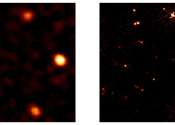Video: How AI and microscopes can help fight infection
Researchers are using AI-powered microscopy to study the bacterium Shigella, offering fresh hope in the battle against antimicrobial resistance.

Researchers are using AI-powered microscopy to study the bacterium Shigella, offering fresh hope in the battle against antimicrobial resistance.
Cell & Microbiology
Jun 5, 2024
0
1

Radio telescopes have an advantage over optical telescopes, in that radio telescopes can be used even in cloudy conditions here on Earth. That's because the longer wavelengths of radio waves can pass through clouds unhindered.
Astronomy
Jun 5, 2024
0
69

Our increasing dependency on pharmaceuticals comes at a major environmental cost, researchers have warned.
Environment
Jun 5, 2024
0
7

One of the potential advantages of quantum computers that scientists are most hopeful about is molecular simulations. These simulations are too complex for classical computers to perform with enough accuracy, but it's possible ...
Quantum Physics
Jun 5, 2024
0
116

Transparent sea cucumbers, bowl-shaped sponges, and pink sea pigs are some of the fascinating animals discovered during a deep-sea expedition to the Pacific Ocean.
Plants & Animals
Jun 5, 2024
0
260

A new method of detecting high-frequency gravitational waves (HFGWs) has been proposed by a research team led by Prof. Tao Liu, Associate Professor from the Department of Physics at the Hong Kong University of Science and ...
Astronomy
Jun 5, 2024
0
83

In a recent publication in Nature Communications, researchers have uncovered significant interactions in sea surface temperature (SST) variations between the Western Australian coast and the western-central tropical Pacific.
Earth Sciences
Jun 5, 2024
0
8

Almost a century ago, the discovery of antibiotics like penicillin revolutionized medicine by harnessing the natural bacteria-killing abilities of microbes. Now, a new study co-led by researchers at the Perelman School of ...
Cell & Microbiology
Jun 5, 2024
0
6

At first glance, the simple sea sponge is no creature of mystery. No brain. No gut. No problem dating it back 700 million years. Yet convincing sponge fossils only go back about 540 million years, leaving a 160 million-year ...
Paleontology & Fossils
Jun 5, 2024
0
102

By taking a close look at the geometrical makeup of rocks where earthquakes originate, researchers at Brown University are adding a new wrinkle to a long-held belief about what causes seismic quakes in the first place.
Earth Sciences
Jun 5, 2024
0
183